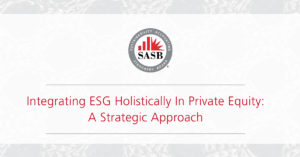Robust ESG integration across a comprehensive set of practitioners has quickly become a reality in the private markets. A rapidly rising number of firms license SASB Standards for use in all stages of investment and reporting processes: over the last three years, the number of private markets entities licensing SASB Standards has grown by 8.3x, from nine to 75 firms across 16 countries spanning five continents. In addition to these organisations, an increasing number of asset owners are leveraging the SASB Standards for both their direct investments and assessment and due diligence of their 3rd party manager ESG competency and integration.
In addition to general partners (GPs) who constitute the majority of licensees, key actors supporting both GPs and limited partners (LPs) include law firms, asset servicers, SaaS platforms and consultants who support various aspects of the closed-end fund lifecycle including due diligence, operational support, collection and synthesis of data, and production of reports. These practitioners facilitate ESG integration into all parts of the investment process for fund managers across the AUM spectrum with both internal ESG capabilities and those relying on outsourced specialists.
This is an exciting inflection point, as SASB Standards are now embedded into private markets infrastructure.
The factors driving acceleration of adoption are becoming increasingly prominent and topical in the industry. First, asset owners are demanding more reliable and comparable data about the ESG issues that are likely to impact a firm’s top-line or bottom-line growth. Next, with record amounts of dry powder driving up acquisition costs, finding ways to create value during ownership is essential for GPs to maintain strong IRRs. One way GPs can add value in this hyper-competitive market is through thoughtful stewardship of ESG issues, including using insights gleaned from pre-investment due diligence to inform data collection during the hold period to help monitor and manage a company’s operations. This not only serves as a value protection and enhancement opportunity, but also serves to satisfy reporting interests of LPs. Another key driver is the likelihood of increased regulation around ESG disclosure, and its undeniable effects on both public and private companies.
The most recent firms licensing SASB Standards represent both the prominence and breadth of market actors recognising the value the SASB Standards offer. Blackstone recently became a licensee of the SASB Standards with plans to integrate the Standards as a component of their investment process. Orrick, Herrington & Sutcliffe became the first law firm to license the SASB Standards as part of their advisory services to support GPs and their portfolio companies with operational and reporting insights. Additionally, BlackRock will be embedding SASB Standards into their private markets platform, eFront, to support LPs & GPs with both portfolio company data collection as well as benchmarking and assessment across SASB industry specific material issues. These firms’ use, amongst many others, demonstrate the multi-faceted permeation of the SASB Standards in private markets and highlight a path toward increased application, transparency, consistency, and comparability of ESG information.
What’s next for ESG integration in the private markets? Sustainability-linked financing continues to offer incentives for private companies to integrate financially material ESG factors into their operational decision making. Additionally, use of the SASB Standards can facilitate commitment to core components of other important initiatives, such as the recently released Institutional Limited Partners Association (ILPA’s) ESG Roadmap.
We look forward to continuing to support the integration of ESG into private markets infrastructure.
Click here to learn more about SASB Standards in private markets and private equity. To see a complete list of firms, including private markets firms, that license SASB Standards (not all firms choose to be public), please click here.

